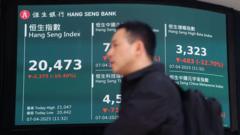As US tariffs propagate fears of a global economic downturn, Asia's manufacturing-centric economies face the dire consequences.
Asian Markets in Turmoil: Economic Fallout of US Tariffs

Asian Markets in Turmoil: Economic Fallout of US Tariffs
Tariff shocks from the US are sending shockwaves through Asian markets, leading to unprecedented declines.
Asian stock markets are witnessing a dramatic downturn as the repercussions of US tariffs, introduced last week, continue to unfold. From Shanghai to Tokyo, significant losses ignited trading sessions on Monday, prompting analysts to label the situation as a "bloodbath." The imposition of tariffs has a direct effect on Asian economies, particularly those heavily reliant on exports to the United States, raising concerns over an impending global trade war that could lead to recessionary pressures.
By midday trading, Japan's Nikkei 225 index had plummeted by 6%, the Australian ASX 200 was down 4%, while South Korea's Kospi index fell by 4.7%. The declines in mainland China were exacerbated as markets reopened after public holiday closures, with the Shanghai Composite dropping more than 6% and the Hang Seng Index in Hong Kong plunging by around 10%.
Market experts warn that the tariffs are contributing to growing inflation expectations and heightening the risk of a recession. Julia Lee, head of FTSE Russell, indicated that such tariffs stoke inflation fears, while Goldman Sachs has adjusted its recession probability for the US economy to 45%, reflecting a significant rise from previous assessments. JPMorgan echoed this sentiment, predicting a 60% chance of economic recession impacting both the US and global economy in the near future.
Countries like Vietnam and Bangladesh, whose markets are heavily dependent on US exports, stand vulnerable under the new tariffs—with Vietnam set to encounter a staggering 46% tariff and Bangladesh's goods facing a 37% increment. US brands such as Nike manufacture goods in Vietnam, while the Bangladeshi garment industry, valued at $8.4 billion annually in US exports, risks severe impacts as tariffs take effect.
Analysts note Asia's unique exposure to potential turmoil due to its trade composition; the region sends more exports to the US than to any other market. The situation is anticipated to worsen, as evidenced by the downturn in global stock markets, which saw major US indexes like the S&P 500 fall nearly 6%, marking the worst weekly performance since 2020. The UK’s FTSE 100 also reported a nearly 5% dip, its steepest in five years, alongside significant declines witnessed in Germany and France.
As markets brace for continued volatility, Lee predicts another challenging trading session on Wall Street, signaling that the toll of the tariffs will extend far beyond American borders, with Asian economies positioned at the frontline of repercussions.






















